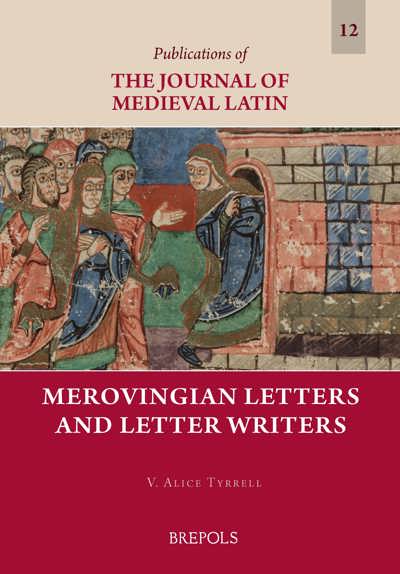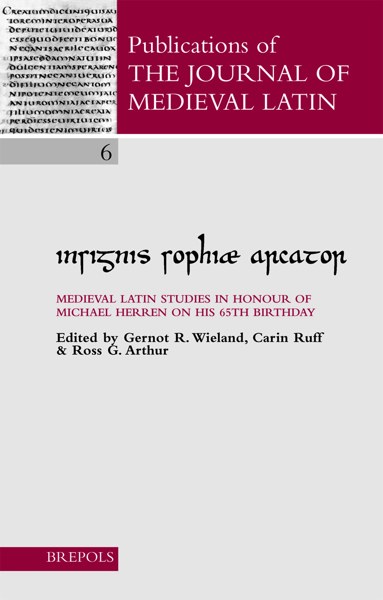
The Material Poetics of the Cambridge Songs
Katja Weidner
- Pages: approx. 310 p.
- Size:178 x 254 mm
- Illustrations:2 b/w, 38 col., 75 tables b/w.
- Language(s):English
- Publication Year:2026
- € 115,00 EXCL. VAT RETAIL PRICE
- ISBN: 978-2-503-61945-3
- Paperback
- Forthcoming (Apr/26)
- € 115,00 EXCL. VAT RETAIL PRICE
- ISBN: 978-2-503-61946-0
- E-book
- Forthcoming
*How to pre-order?
A material philological interpretation of the Cambridge Songs that provides a glimpse into the Latin lyric practice of the eleventh century.
Katja M. Weidner is Assistant Professor of Medieval Latin Studies at the University of Vienna. She is the recipient of a research grant of the Austrian Science Fund (FWF) investigating the material transmission of the Latin Alexander Romance.
The Cambridge Songs is the only Medieval Latin lyric collection compiled between the Carolingian period and the twelfth century. As such it forms an important piece in the puzzling history of medieval songbooks. Of even greater interest is the happenstance that these songs do not survive in a separate volume by themselves but are embedded in the multiple-text manuscript Cambridge, University Library, MS Gg. 5.35 (mid-eleventh century, St. Augustine, Canterbury [?]) and are thus transmitted alongside Late Antique and Carolingian poetry, riddles and medical excerpts.
This book offers the first interpretation of the songs from the perspective of material philology, examining both codex and lyric collection in terms of compilation, and the poems in terms of their textual variants and arrangement within the collection. Embracing the materiality of the collection in this way affords unique insights into eleventh-century lyric practices.
Note to the Reader
Introduction
I. The Cambridge Songs in their Codex
1. Editorial Struggles
a. Changing Paradigms
b. The Missing Leaf
c. State of Art
2. Codicological Setting
a. States of Production, States of Transmission
b. The Authorial Paradigm
c. Clusters of Unattributed Poetry
d. The Contents Lists
3. The Collection within the Collection
a. The Case for Three Compilations
b. A Note on David and Goliath
4. The Status of the Cambridge Songs as a Compilation
II. On Textual Variance and the Question of Form
1. Reframing the Classics in the Cambridge Songs
a. The Exemplarity of Hector (CC 34)
b. Fate Repeated, Fate Reframed (CC 29; 31; 32)
c. Neobule’s Sorrow (CC 46)
d. "I, who once wrote poems" (CC 50–76)
2. Twittered Songs and Moving Strophes
a. Manuscript Transmission of the Nightingale (CC 10)
b. Patterns of Variation I: Layout
c. Patterns of Variation II: Strophic Arrangement
d. Revisiting the Short Version
e. The Question of Primary Variance
3. Rethinking the Interpolated Versicles
a. The Variant Narrative of the Modus Liebinc (CC 14)
b. Interpolatory Practice in the Modus qui et Carelmanninc (CC 5)
4. Concinnity and Disruption of Form
a. Cobbo and Lantfrid (CC 6)
b. Yet Another Triple Versicle (CC 13)
c. A Note on the Mnemonic Prose (CC 21)
d. The Practice of Bricolage (CC 1; 37; 44; 45)
e. The Case for CC 38 and CC 38A
5 Textual Paradigms of the Cambridge Songs
III. The Practice of Poetic Constellation
1. Constellation and Compilatory Practice
a. Concatenation in CC-A
b. The Paradigm of Singer and Song
c. Constellations beyond the Cambridge Songs
2. Constellatory Reading Practices
a. Constellations of Censorship
b. Pointers from Readers Past
3. Constellation and Prior Textual Practice (CC 27/28)
4. Constellation and Meaning
a. Interpreting the Sole Female Voice in CC 40
b. Constellating the Female Voices in CC-A
c. Retracing (One) Contemporary Meaning
5. Constellation as a Paradigm of Poetics
Epilogue
Bibliography
Unpublished Archival Sources
Primary Literature
Cambridge Songs
Other Works
Secondary Literature
Indices




